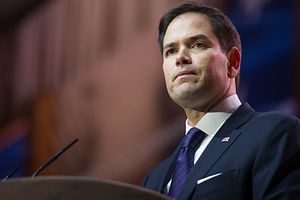The third Republican presidential debate at the University of Colorado in Boulder was a key contest for the survival of the fittest. With economic issues taking the foreground and foreign policy in the background, this round marked a critical crossroads for winnowing the contestant field. On a substantive level, each had to show economic policy acumen. In terms of style, compelling message delivery was imperative. Despite minimal mention of national security, the ubiquity of China implicitly pervaded messaging on tackling federal debt, U.S. global economic competitiveness, climate change, job creation, and bringing manufacturing capabilities back to the United States. While candidates’ plans for reforming the tax code, Social Security, and student loans reflected technical differences, it was clear all grasped the magnitude of U.S. economic challenges and its implications for U.S. global leadership.
We break down candidates’ debate performances in three categories:
High Stakes. Sharing center stage Donald Trump and Ben Carson sought to show which “outsider” could seize the inside lane. Trump lacked detailed policy plans. His predictable braggadocio undercut any attempts to rationalize how he would grow the economy without reforming Social Security and Medicare. In using his closing remarks to rant about the debate format, Trump reinforced his brutish style. Ben Carson’s reflective composure held steady in the absence of a standout performance, but may have benefitted from Trump’s tiresome tirades. Jeb Bush faced the fight of his political life. His underwhelming delivery and scripted retorts probably did not help resuscitate his flagging poll position. Going into this round, Marco Rubio, Bush’s chief rival, had to punch above his weight to make a clear break from the pack. A few memorable moments – countering Jeb Bush’s admonition to resign from the Senate, calling out the mainstream media as the Democrats’ Super PAC, and taking a stand against anything bad for his mother – met with uproarious audience applause and likely spiked Rubio’s standing. Ted Cruz’s description of the Democratic debate as one between Bolsheviks and Mensheviks and characterizing the media as untrustworthy was a reminder that he cannot be underestimated to tap into fiery conservative conviction.
Flank Stakes. Fighting from the flanks, John Kasich, Mike Huckabee, Carly Fiorina, Chris Christie, and Rand Paul scored high on content and conviction but mediocre on delivery. Kasich appeared uptight. Despite Huckabee’s compelling closing remarks, he had to fight to be heard. Fiorina held her own but did not deliver the much-needed grand-slam performance she gave in the second debate. Chris Christie’s straight-shooter style was much sharper, particularly with his jab at the moderator’s rudeness even by New Jersey standards. But a respectable performance may not be enough for long-term traction. Though less combative this round, Rand Paul lacked inspiration.
Secondary Stakes. In the undercard category, with the exception of Bobby Jindal, the others – George Pataki, Rick Santorum and Lindsey Graham – all took swipes at China on pollution, cyberattacks and manufacturing jobs. But in explaining that economic security is related to national security, Graham’s hand gestures of a clenched fist and open hand in dealing with China and declaring that as commander-in-chief “the crap stops here” was a reminder of China’s presence at the debate.

































